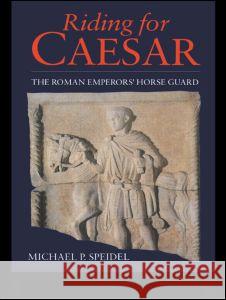Riding for Caesar: The Roman Emperor's Horseguard » książka
Riding for Caesar: The Roman Emperor's Horseguard
ISBN-13: 9780713467505 / Angielski / Twarda / 1994 / 244 str.
Riding for Caesar: The Roman Emperor's Horseguard
ISBN-13: 9780713467505 / Angielski / Twarda / 1994 / 244 str.
(netto: 606,39 VAT: 5%)
Najniższa cena z 30 dni: 628,93
ok. 16-18 dni roboczych.
Darmowa dostawa!
The equites singulares Augusta had a very particular role to play in Roman history. They acted as bodyguards to the emperors and as such were used to protect them and ensure their safety; they were also an elite strategic reserve. This book traces their development and the intimate part they played in the fate of the Roman empire and its emperors.
During the Republic, Rome had no permanent guard as she had no ruler and no standing army. But as soon as emperors came to power, they raised a horse guard, for one-man rule hinged on it, in peace as well as in war. The history of the Roman horse guard in fact begins at Noviodunum, in 52BC, when they saved Caesar in Gaul. Michael Speidel here traces the history of the tall, fierce and faithful horsemen from that monument until they perished with Maxentius, drowning in the battle at the Mivian Bridge.
The horse guardsmen of the Roman emperors, the equites singulares Augusti, had a decisive role to play in Roman history. They were the emperors' bodyguard and as such they watched over him and ensured his safety wherever he went. They served as parade troops in the capital and as crack troops, forming an elite strategic reserve. Through them the emperors also secured the loyalty and training of frontier troops. Recruited first among German tribes, especially the Batavi, and later also among Danubian peoples, they retained their native spirit and fighting techniques and were housed in their own forts in Rome. Chosen for strength, good looks and their ability to swim rivers in full battle gear, they were a striking sight, as recorded in both written accounts and art.
Based on literary, archaeological and epigraphic sources, Professor Speidel's book represents the first history of the Roman horse guard ever written and provides a readable account of the intricate part these men played in the fate of the Roman empire and its emperors.











